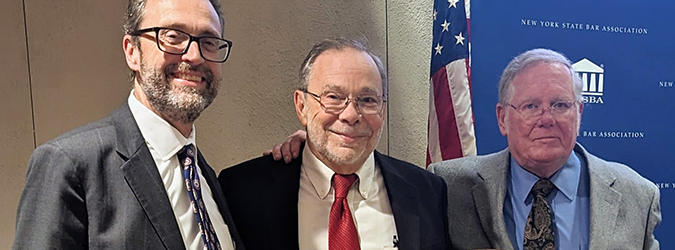NYSBA Recommends Reducing Reliance on Prisons and Courts as the Primary Treatment for People With Mental Illness
5.30.2023
The legal system needs to move away from its role as the primary treatment for people with mental illness, the New York State Bar Association recommends in a report approved by its Executive Committee.
In the report, the Task Force on Mental Health and Trauma Informed Representation detailed the many ways that people in crisis end up entangled in the legal system. The association’s House of Delegates, its governing body, will consider the report at its meeting June 10 in Cooperstown.
“This timely report touches on every aspect of the practice of law that intersects with the mental health community,” said New York State Bar Association President Sherry Levin Wallach, who appointed the task force. “I am proud that our work will continue to help make sure that all people living with mental illnesses and trauma are able to access support and resources to assist them in living a full life and are treated with dignity and respect. Our goal is to make sure that the stigma of living with mental illness is erased.”
The report recommends that:
- Criminal courts divert people in a mental health crisis away from incarceration
- Judges and juries receive more training on implicit bias
- Lawyers and law students be taught trauma-informed best practices
- Funding be increased for beds in treatment centers
- Data be collected on individuals with mental illness who end up in the justice system
- The New York State Bar Association create a permanent standing committee on mental health
The report also recommends amending Article 81 in New York State’s Mental Hygiene Law to explicitly include supported decision-making principles in which trusted people help an individual with mental disabilities and/or guardianship needs. The goal is to maintain a person’s independence and autonomy through the least-restrictive means possible.
The report also calls for “seamless systems” between the mental health, criminal justice, and civil justice systems. That way, instead of being left to navigate separate and complex programs, an individual can enter at any point and access the full range of services.
“Over the past year, we have had the privilege of working with many of New York State’s foremost experts on the law and behavioral health,” said the co-chairs of the task force, Joseph A. Glazer, the Westchester County deputy commissioner, Department of Community Mental Health, and Shelia E. Shea, director of the Mental Hygiene Legal Service, Third Judicial Department. “As we seek endorsement by the full bar association, we want to express our gratitude to those who have been part of the work, those who have reviewed it with a keen eye and our colleagues who collectively will use it as a tool to make our system more just for those living with behavioral health needs.”
About the New York State Bar Association
The New York State Bar Association is the largest voluntary state bar association in the nation. Since 1876, NYSBA has helped shape the development of law, educated and informed the legal profession and the public, and championed the rights of New Yorkers through advocacy and guidance in our communities.






